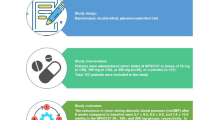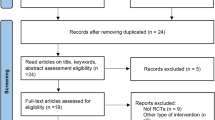Abstract
Most patients with hypertension need more than one drug to achieve blood pressure (BP) control. This randomized, double-blind, multifactorial study evaluated whether combinations of aliskiren and amlodipine provided superior BP reductions to component monotherapies in patients with hypertension (mean sitting diastolic BP (msDBP) 95–<110 mm Hg). Overall, 1688 patients were randomized to once-daily monotherapy with aliskiren 150 or 300 mg or amlodipine 5 or 10 mg, combination therapy with one of four corresponding aliskiren/amlodipine doses, or placebo for 8 weeks. At week 8 end point, aliskiren/amlodipine combinations provided significant msDBP reductions from baseline of 14.0–16.5 mm Hg, compared with reductions of 8.0 and 10.2 mm Hg for aliskiren 150 and 300 mg, respectively (P<0.001), and 11.0 and 13.8 mm Hg for amlodipine 5 and 10 mg, respectively (P<0.05). Aliskiren/amlodipine combinations provided reductions in mean sitting systolic BP 20.6–23.9 mm Hg, compared with decreases of 10.7 and 15.4 mm Hg for aliskiren 150 and 300 mg, respectively (P<0.001), and 15.8 and 21.0 mm Hg for amlodipine 5 (P⩽0.001) and 10 mg (P=NS), respectively. Aliskiren/amlodipine combination therapy provides greater BP lowering than either agent alone, hence offering an effective treatment option for patients with hypertension.
This is a preview of subscription content, access via your institution
Access options
Subscribe to this journal
Receive 12 digital issues and online access to articles
$119.00 per year
only $9.92 per issue
Buy this article
- Purchase on Springer Link
- Instant access to full article PDF
Prices may be subject to local taxes which are calculated during checkout




Similar content being viewed by others
References
Chobanian AV, Bakris GL, Black HR, Cushman WC, Green LA, Izzo JL et al. Seventh report of the Joint National Committee on Prevention, Detection, Evaluation, and Treatment of High Blood Pressure. Hypertension 2003; 42: 1206–1252.
Mancia G, Laurent S, Agabiti-Rosei E, Ambrosioni E, Burnier M, Caulfield MJ et al. Reappraisal of European guidelines on hypertension management: a European Society of Hypertension Task Force document. J Hypertens 2009; 27: 2121–2158.
Azizi M, Webb R, Nussberger J, Hollenberg NK . Renin inhibition with aliskiren: where are we now, and where are we going? J Hypertens 2006; 24: 243–256.
Brown MJ, McInnes GT, Cherif PC, Zhang J, MacDonald TM . Aliskiren and the calcium channel blocker amlodipine combination as an initial treatment strategy for hypertension control (ACCELERATE): a randomised, parallel-group trial. Lancet 2011; 377: 312–320.
Williams B, Poulter NR, Brown MJ, Davis M, McInnes GT, Potter JF et al. Guidelines for management of hypertension: report of the fourth working party of the British Hypertension Society, 2004-BHS IV. J Hum Hypertens 2004; 18: 139–185.
Hung HM . Evaluation of a combination drug with multiple doses in unbalanced factorial design clinical trials. Stat Med 2000; 19: 2079–2087.
Braun-Dullaeus RC, Zhang J, Hristoskova S, Haring DA, Liao W . First-line therapy with aliskiren/amlodipine combination provides robust blood pressure reductions in patients with moderate to severe hypertension. J Clin Hypertens 2010; 12 (Suppl 1): abstract 27 PO-22.
Littlejohn TW, Trenkwalder P, Hollanders G, Zhao Y, Liao W . Long-term safety, tolerability and efficacy of combination therapy with aliskiren and amlodipine in patients with hypertension. Curr Med Res Opin 2009; 25: 951–959.
Gupta AK, Arshad S, Poulter NR . Compliance, safety, and effectiveness of fixed-dose combinations of antihypertensive agents: a meta-analysis. Hypertension 2010; 55: 399–407.
Shah NR, Hirsch AG, Zacker C, Wood GC, Schoenthaler A, Ogedegbe G et al. Predictors of first-fill adherence for patients with hypertension. Am J Hypertens 2009; 22: 392–396.
Kettani FZ, Dragomir A, Cote R, Roy L, Berard A, Blais L et al. Impact of a better adherence to antihypertensive agents on cerebrovascular disease for primary prevention. Stroke 2009; 40: 213–220.
Perreault S, Dragomir A, White M, Lalonde L, Blais L, Berard A . Better adherence to antihypertensive agents and risk reduction of chronic heart failure. J Intern Med 2009; 266: 207–218.
Wu PH, Yang CY, Yao ZL, Lin WZ, Wu LW, Chang CC . Relationship of blood pressure control and hospitalization risk to medication adherence among patients with hypertension in Taiwan. Am J Hypertens 2010; 23: 155–160.
Drummond W, Munger MA, Rafique EM, Maboudian M, Khan M, Keefe DL . Antihypertensive efficacy of the oral direct renin inhibitor aliskiren as add-on therapy in patients not responding to amlodipine monotherapy. J Clin Hypertens 2007; 9: 742–750.
Black HR, Weinberger MH, Purkayastha D, Lee J, Israel M, Hilkert R et al. Combination aliskiren/amlodipine is more effective than amlodipine monotherapy in male and female African American subjects with stage 2 hypertension. J Clin Hypertens 2010; 12 (Suppl 1): abstract 26 PO-20.
Acknowledgements
All authors participated in the development and writing of the paper, and approved the final paper for publication. The authors take full responsibility for the content of the paper and thank Dr Steven Inglis (Oxford PharmaGenesis Ltd, UK) and Dr Adam Tearle (Novartis Pharmaceuticals Corporation, East Hanover, NJ, USA) for medical writing support, editorial assistance, and collation, and incorporation of comments from all authors. This work was funded by Novartis Pharmaceuticals Corporation.
Author information
Authors and Affiliations
Corresponding author
Ethics declarations
Competing interests
J Zhang, H Hsu and DL Keefe are employees of Novartis Pharmaceuticals Corporation and are therefore eligible for Novartis stock and stock options. The remaining authors declare no conflict of interest.
Rights and permissions
About this article
Cite this article
Littlejohn, T., Jones, S., Zhang, J. et al. Efficacy and safety of aliskiren and amlodipine combination therapy in patients with hypertension: a randomized, double-blind, multifactorial study. J Hum Hypertens 27, 321–327 (2013). https://doi.org/10.1038/jhh.2012.42
Received:
Revised:
Accepted:
Published:
Issue Date:
DOI: https://doi.org/10.1038/jhh.2012.42
Keywords
This article is cited by
-
The role of aliskiren in the management of hypertension and major cardiovascular outcomes: a systematic review and meta-analysis
Journal of Human Hypertension (2019)



